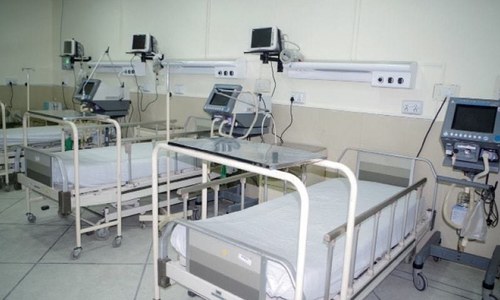Prime Minister Imran Khan on Saturday once again defended his government's decision to end the coronavirus lockdown in the country, saying such sweeping restrictions could cause a "collapse of the economy" and give rise to poverty in poor countries.
Taking to Twitter, he said the world has discovered through experience that the only solution to the Covid-19 crisis is imposing a "smart lockdown" that allows economic activity to continue while implementing standard operating procedures (SOPs).
"We are amongst [the] pioneers of this approach," he said, referring to the smart lockdown strategy under which only virus hotspots are placed under lockdown.
Related: Lockdown: ‘Total’ to ‘smart’
The premier highlighted the "dilemma confronting our government" currently by sharing a news channel's video report in which numerous Pakistanis can be heard casting doubts on the gravity of the coronavirus spread and terming it an "international conspiracy".
"On the one hand we have the masses who are not taking the COVID19 pandemic seriously and on the other hand, understandably, we have our frontline doctors and health professionals, who are at great risk," he said while commenting on the video.
He said some of the country's "elite" wanted a lockdown to be imposed across the country but noted that these were people "who have the privilege of spacious homes and income unaffected by [the] fallout of lockdown".
"A lockdown means [a] collapse of the economy and in poorer countries a steep rise in poverty, crushing the poor as happened in Modi's lockdown in India," he added.
The prime minister's remarks come as Pakistan's delicate healthcare system braces for an imminent peak of coronavirus cases, with a sharp rise in the number of deaths and hospitals reporting being overwhelmed with increasing cases of infection.
More than 5,000 cases of the virus were reported from across the country on Saturday, the highest daily increase in the number of infections since the first case was confirmed on February 26.
In Karachi and Lahore, hospitals are already struggling because of a sharp increase in Covid-19 patients in recent weeks, with reports saying some major private hospitals are turning away patients because of a shortage of beds.
Prime Minister Imran in his tweets appealed to the civil society, media, ulema and his Corona Relief Tiger Force to "create awareness amongst the public of COVID19's severity and the need to strictly observe SOPs".
‘Herd immunity’
The government lifted the lockdown on May 9, about two weeks before Eidul Fitr. Transport and most businesses have re-opened but cinemas, theatres and schools remain closed.
There has been growing debate among experts globally on whether populous developing nations can afford comprehensive social distancing measures to contain the coronavirus while avoiding economic ruin.
Some officials have suggested “herd immunity” could contain the virus, a situation where enough people in a population have developed immunity to an infection to be able to effectively stop that disease from spreading.
However, the World Health Organisation (WHO) has warned countries that have “lax measures” in place against counting on herd immunity to halt the spread of Covid-19.
Yet even those advocating rolling back strict lockdowns in developing nations are alarmed at the teeming crowds in Pakistan's streets, shopping malls and mosques, the ramping up of domestic flights, and the movement of millions of people for the Eid holiday.
“It's not about this dichotomy between complete lockdown and fully open,” Ahmed Mushfiq Mobarak, a professor of economics at Yale University, earlier told Reuters.
He said a smarter strategy would be to allow people out for core economic and public health activities, rather than a total relaxation of rules.
“There should still be complete bans on religious gatherings and social gatherings [...] those are things for which we need to see much better leadership,” he said.
















































